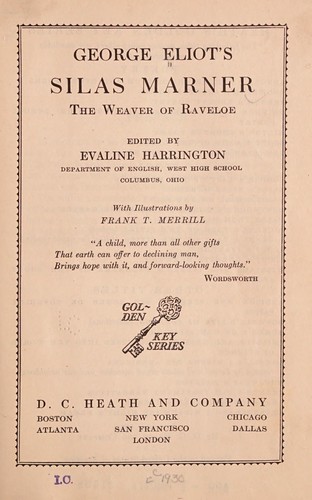M@ reviewed George Eliot's Silas Marner by George Eliot (Golden key series)
Review of "George Eliot's Silas Marner" on 'Goodreads'
2 stars
Dashing Godfrey Cass, son of the richest man in the honest rural enclave of Raveloe, wishes to marry Nancy Lammeter, the beautiful daughter of the second-richest man in Raveloe. Alas, he cannot, as he is already married to Molly, woman whom he apparently dislikes. Although we are never told why they dislike each other, it's possible that it's because of her low birth and/or comorbid opium addiction. And although you're expecting the "low birth" part to be tied to nobility, as this novel is set in 1800's England and the Cass family is both the richest family and apparently collects some rent from parts of the village, there's no title nonsense of any sort.
His brother Dunstan has been regularly tapping him for money to keep this shameful secret marriage from their father, who would obviously disown Godfrey on the spot, and from Nancy, who would never deign to marry someone who was already married, presumably because of the risk of her new husband being dragged off to prison for bigamy. Dunstan does offer the morbid suggestion that maybe Molly will take one hit too many on the opium pipe and die, freeing him from this troublesome entanglement. Godfrey is understandably repelled by this...no, just kidding, he contemplates it hopefully, although not with any sort of verve.
In the stirring climax of the novel, Dunstan commits a petty theft from a local weaver and falls into a hole, freeing Godfrey from the blackmail. Molly is bringing their daughter (they had a daughter whom both I and the author neglected to mention to this point) to Godfrey's house to cause a scandal. She takes one hit too many on the opium pipe and lies down in the snow, freeing Godfrey from the troublesome entanglement. The baby is taken in by the same local weaver.
The end!
Okay, so you know that's not actually the main plot of the novel. And that neither Godfrey nor Nancy is even close to the main character of Silas Marner. It turns out that the local weaver, Silas Marner, is the main character.
He's a bit of a hermit (due to falsely being accused of theft earlier), and a bit of a miser, and we do have some nice atmospheric bits about him enjoying counting his money. And then some stuff about him being pretty despondent about Dunstan stealing it. And then about how he takes to the baby, and becomes part of the community as part of the effort of raising her. And is sort of healed by parenting her. I actually really liked this plot and that character, as we've seen it, and if that was the whole book we'd have been done with this review paragraphs ago.
But it's interleaved with the interminable "love" affair of Godfrey and Nancy. Godfrey is essentially Hamlet, except he's Hamlet with none of the stakes and none of the poetry. Nancy is an unlikable prat into whom George Eliot injected the pointless vapid moralism of the society that rejected her common-law marriage to George Lewes, who also got into an early marriage and couldn't extricate himself to marry Eliot, which probably makes the opium death of Molly in the snow some sort of twisted Freudian wish-fulfillment.
So, Silas Marner and his story -- probably a soft three stars, padded to four by the writing, some of which is quite good! -1 star for each of Godfrey and Nancy. They were awful and not even in a good way.

